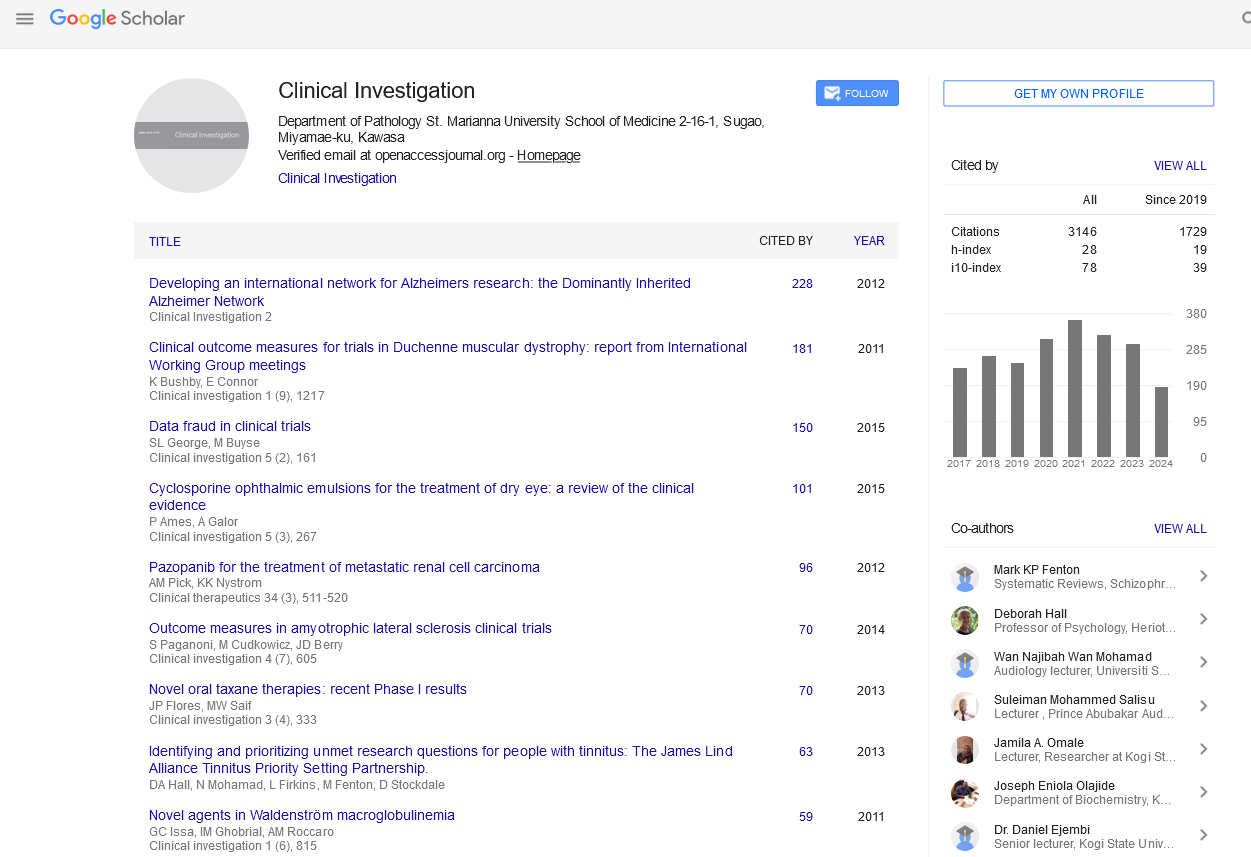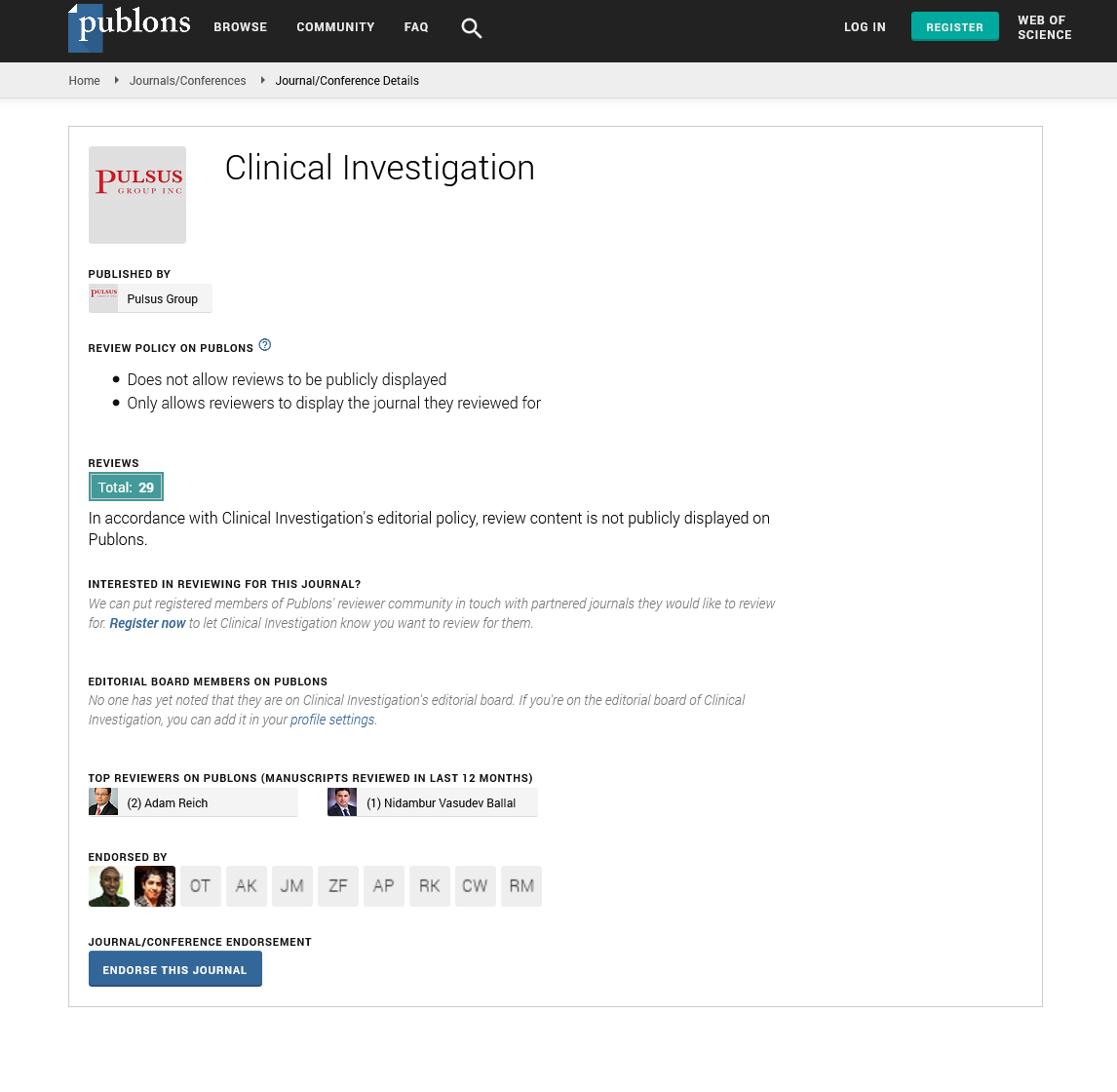Perspective - Clinical Investigation (2024) Volume 14, Issue 2
Advancements in surgical techniques: A comprehensive review
- Corresponding Author:
- Youeint Sin
Department of Medical Surgery,
Cairo University,
Giza,
Egypt
E-mail: abojo92568@gmail.com
Received: 18-Oct-2023, Manuscript No. FMCI-23-117281; Editor assigned: 20-Oct-2023, PreQC No. FMCI-23-117281 (PQ); Reviewed: 03-Nov-2024, QC No. FMCI-23-117281; Revised: 11-Jul-2024, Manuscript No. FMCI-23-117281 (R); Published: 18-Jul-2024, DOI: 10.3752/2041-6792.2024.14(2).503-505
Abstract
This article delves into the evolution and advancements in surgical techniques, exploring the innovations that have shaped the field of surgery. From ancient practices to modern breakthroughs, the article provides a comprehensive overview of surgical procedures, technologies, and their impact on patient outcomes.
Keywords
Surgical • Technologies • Tumours • Patient
Introduction
Surgery, one of the oldest medical practices, has undergone remarkable transformations over the centuries. This article aims to trace the historical development of surgical techniques, highlighting key milestones, and examining the cutting-edge technologies that define contemporary surgical practices.
Surgery, an ancient medical practice, has witnessed a remarkable evolution throughout history. In ancient civilizations, practices such as trepanation, limb amputations, and wound suturing marked the rudimentary stages of surgery. The influence of figures like Galen in ancient times and the emergence of barber-surgeons during the middle ages and the Renaissance played pivotal roles in shaping early surgical knowledge.
Description
The transition to the era of antiseptic surgery was a turning point. Ignaz Semmelweis's groundbreaking work on hand washing and Joseph Lister's introduction of carbolic acid significantly reduced infections, revolutionizing surgical practices. The concurrent development of surgical anesthesia further enhanced the safety and feasibility of various procedures.
The technological revolution in surgery, marked by the introduction of the surgical microscope, brought unprecedented precision to delicate surgeries. The advent of laparoscopy and minimally invasive techniques ushered in a new era, offering advantages such as quicker recovery times and reduced scarring. Robotic surgery emerged as a transformative force, enabling surgeons to perform complex procedures with enhanced precision and even remotely.
Surgery has diversified into specialized fi el ds, each witnessing significant advancements. In cardiothoracic surgery, innovations like heart transplants and minimally invasive cardiac procedures have reshaped treatment possibilities. Neurosurgery has seen remarkable progress with techniques such as brain mapping and neurostimulation. Similarly, orthopedic surgery has evolved with joint replacements, arthroscopy, and regenerative orthopedics.
Looking ahead, the future of surgery is intertwined with cutting-edge technologies.
Nanotechnology holds promise in drug delivery, imaging, and targeted therapies, potentially revolutionizing treatment approaches. Artificial Intelligence (AI) is increasingly integrated into preoperative planning, diagnostics, and even robotic-assisted surgeries, paving the way for more efficient and personalized interventions.
However, the path forward is not without challenges. Ethical considerations surrounding emerging technologies, ensuring equitable access to advanced surgical care, and the need for continuous professional training present ongoing hurdles. As surgery continues to push the boundaries of medical science, its journey reflects a relentless pursuit of improving patient outcomes and addressing the ever-evolving landscape of healthcare.
Surgical advancements have been instrumental in transforming healthcare landscapes globally. The evolution of surgical techniques, technologies, and practices has not only improved patient outcomes but has also redefined the scope and possibilities of medical interventions. This comprehensive review explores the multifaceted journey of surgery, from its historical roots to the forefront of modern innovation.
Surgery, as one of the oldest medical practices, has a rich history dating back to ancient civilizations. Early surgical procedures, albeit rudimentary, laid the groundwork for the discipline. The ancient Greeks, particularly figures like Hippocrates and Galen, contributed significantly to early surgical knowledge. Fast forward to the middle ages and renaissance, where barber-surgeons conducted various procedures, marking a transitional phase.
A watershed moment came with the advent of antiseptic surgery. Ignaz Semmelweis's advocacy for hand washing and Joseph Lister's introduction of antiseptic techniques drastically reduced infections, enhancing the safety of surgeries. Simultaneously, the discovery and application of surgical anesthesia revolutionized the pain management aspect of surgical procedures.
The technological revolution in the 19th and 20th centuries significantly impacted surgical practices. The surgical microscope, for instance, brought a new level of precision to intricate procedures. The era of minimally invasive surgery dawned with laparoscopy, offering benefits like shorter recovery times and reduced scarring. The integration of robotic systems into surgery further elevated precision, with teleoperated procedures becoming a reality.
As surgical practices diversified, specialized fields emerged, each witnessing groundbreaking advancements. In cardiothoracic surgery, innovations such as heart transplants and minimally invasive cardiac procedures have redefined treatment possibilities. Neurosurgery, propelled by technologies like brain mapping and neurostimulation, has seen transformative breakthroughs. Orthopedic surgery, too, has evolved with joint replacements, arthroscopy, and regenerative orthopedics.
The future trajectory of surgery is inseparable from cutting-edge technologies. Nanotechnology, operating at the microscopic level, holds promise in drug delivery systems, imaging enhancement, and targeted therapies, potentially revolutionizing treatment approaches. Artificial Intelligence (AI) is increasingly becoming a crucial ally in surgery, aiding in preoperative planning, diagnostics, and even assisting in robotic-assisted surgeries, promising greater efficiency and personalization.
Despite the remarkable strides, the path forward for surgery is not devoid of challenges. Ethical considerations around emerging technologies, equitable access to advanced surgical care, and the imperative for continuous professional training are ongoing concerns. The dynamic interplay between technological innovation, ethical considerations, and healthcare disparities will shape the future landscape of surgery.
Conclusion
In conclusion, the journey of surgery reflects a relentless pursuit of improvement, innovation, and adaptability. From ancient practices to the forefront of technological marvels, surgery continues to be a dynamic force in enhancing patient care and pushing the boundaries of medical science. As the field embraces the future, the focus remains steadfast on advancing patient outcomes and navigating the complexities of 21st century healthcare.
The contemporary landscape of surgery is marked by global collaborations and knowledge exchange. Telemedicine and tele-surgery have emerged as powerful tools, enabling surgeons to collaborate across borders, share expertise, and even participate in surgeries remotely. This interconnectedness fosters a culture of continuous learning and ensures that the latest advancements are disseminated worldwide. International collaborations have played a pivotal role in addressing healthcare disparities and bringing advanced surgical care to regions with limited resources.
The era of personalized medicine is influencing surgical practices profoundly. Genomic surgery, an evolving field, leverages insights from an individual's genetic makeup to tailor surgical interventions. This not only enhances treatment efficacy but also minimizes adverse effects. Precision medicine, coupled with advances in genetic editing technologies like CRISPR, holds the promise of targeted and highly effective surgical treatments, ushering in a new era of individualized healthcare.


